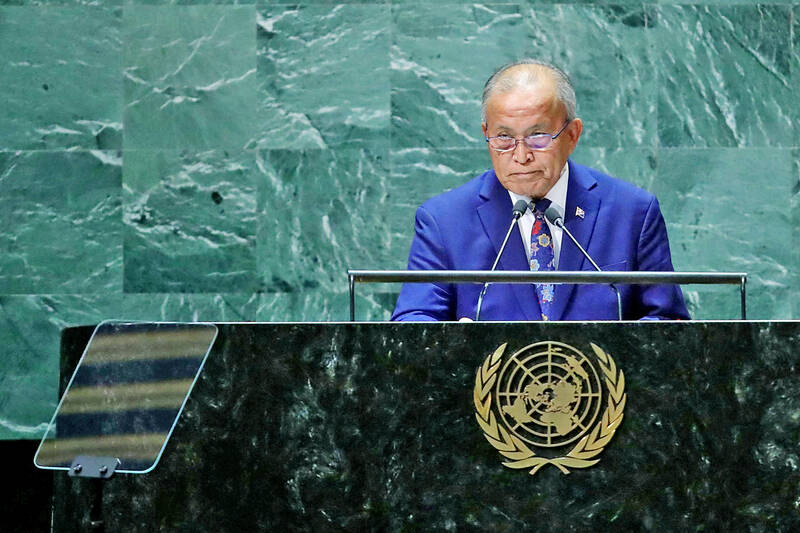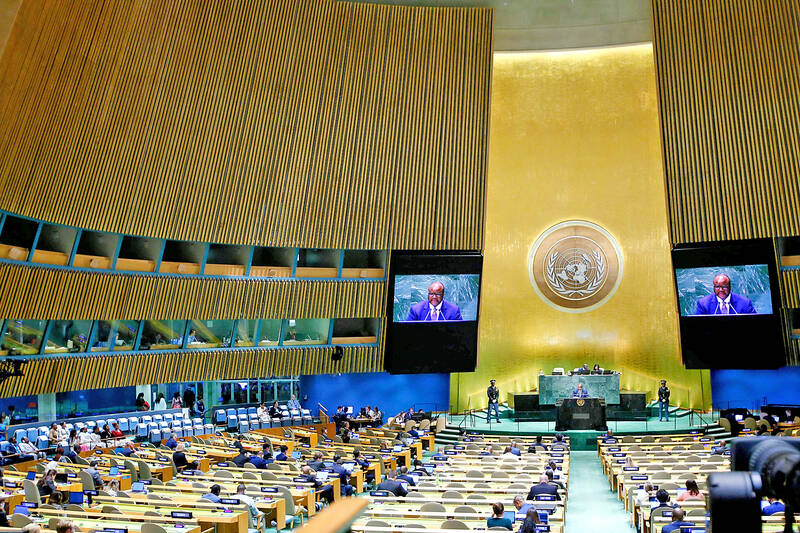Marshall Islands President David Kabua on Wednesday called on the UN to rescind its interpretation of Resolution 2758, which bars Taiwan from participating in the international organization.
There is still a “visible crack” in the UN, as it “will never be whole and complete without the meaningful participation of the 23 million people of Taiwan,” Kabua said in his address on the second day of the General Debate at the 78th General Assembly in New York.
He also criticized the UN’s specialized agencies, meetings and mechanisms for what he described as their continuous efforts to close the doors to journalists and visitors from Taiwan.

Photo: AFP
The root of the problem is that the “UN bureaucracy” continues to stick to a “wrongful misinterpretation of Resolution 2758,” using it to bar UN engagement with the people of Taiwan and their democratic system, he said.
“We must have the courage to recognize the reality of the present situation and relegate this outdated dogma to the vaults of history,” said Kabua, whose Pacific island nation has been a diplomatic ally of Taiwan for 25 years.
Taiwan left the UN in 1971. Resolution 2758, which was adopted by the UN 26th General Assembly in 1971 to resolve the issue of China’s representation, recognizes the People’s Republic of China (PRC) as the “only lawful representative of China,” but does not mention Taiwan and does not state that “Taiwan is part of the PRC,” as China claims.

Photo: AFP
King Mswati III of Eswatini, Taiwan’s only diplomatic ally in Africa, also voiced his support for Taiwan’s inclusion in the UN in his address on Wednesday.
“Sustaining the SDGs [Sustainable Development Goals] will require that member states develop innovative financing strategies to ensure that implementation reaches those most left behind,” King Mswati said.
“At this critical juncture, including Taiwan is an essential next step if we are to successfully achieve the 2030 Agenda for Sustainable Development,” he said. “We call for Taiwan’s inclusion in the United Nations system, which encompasses participation in meetings, mechanisms and activities that pertain to the implementation of the Sustainable Development Goals.”
Doing so would not only improve global cooperation and partnership, but also emphasize the principle of ensuring that “no one is left behind,” he said.
The day before, Belizean President John Briceno also emphasized Taiwan’s role in helping further the SDGs.
“The SDGs is a collective commitment. Taiwan and other partners are supporting our pursuit, and we call on others to join us in inclusivity, equity and solidarity,” Briceno said.
The 78th General Assembly began on Sept. 5 at the UN headquarters in New York and the General Debate is being held until Tuesday next week.
Separately, Representative to the US Hsiao Bi-khim (蕭美琴) in a USA Today op-ed on Wednesday reiterated a call for the UN and international organizations to permit Taiwanese participation.
Detailing the ways in which the UN has misinterpreted Resolution 2758 to shut Taiwan out of the organization and its bodies, such as the WHO, Hsiao wrote that “the people of Taiwan resent this discrimination.”
“There is an urgent need to stop Resolution 2758’s misinterpretation, which has not only damaged the rule of law within the United Nations, but also silenced the voices of the Taiwanese people,” she wrote.
“The United Nations should bear in mind that it is ruled by the peoples, not by authoritarian regimes,” she said, quoting from its founding charter.
“The legitimacy and moral authority of the United Nations to use its power is lawful only when consented to by the peoples over which that political power is exercised,” she added.

The Ministry of the Interior (MOI) is to tighten rules for candidates running for public office, requiring them to declare that they do not hold a Chinese household registration or passport, and that they possess no other foreign citizenship. The requirement was set out in a draft amendment to the Enforcement Rules of the Public Officials Election and Recall Act (公職人員選舉罷免法 ) released by the ministry on Thursday. Under the proposal, candidates would need to make the declaration when submitting their registration forms, which would be published in the official election bulletin. The move follows the removal of several elected officials who were

The Republic of China (ROC) is celebrating its 114th Double Ten National Day today, featuring military parades and a variety of performances and speeches in front of the Presidential Office in Taipei. The Taiwan Taiko Association opened the celebrations with a 100-drummer performance, including young percussionists. As per tradition, an air force Mirage 2000 fighter jet flew over the Presidential Office as a part of the performance. The Honor Guards of the ROC and its marching band also heralded in a military parade. Students from Taichung's Shin Min High School then followed with a colorful performance using floral imagery to represent Taiwan's alternate name

FOUR DESIGNATED AREAS: Notices were issued for live-fire exercises in waters south and northwest of Penghu, northeast of Keelung and west of Kaohsiung, they said The military is planning three major annual exercises across the army, navy and air force this month, with the navy’s “Hai Chiang” (海強, “Sea Strong”) drills running from today through Thursday, the Ministry of National Defense said yesterday. The Hai Chiang exercise, which is to take place in waters surrounding Taiwan, would feature P-3C Orion maritime patrol aircraft and S-70C anti-submarine helicopters, the ministry said, adding that the drills aim to bolster the nation’s offshore defensive capabilities. China has intensified military and psychological pressure against Taiwan, repeatedly sending warplanes and vessels into areas near the nation’s air defense identification zone and across

COVETED PRIZE: The US president would be a peace prize laureate should he persuade Xi Jinping to abandon military aggression against Taiwan, William Lai said US President Donald Trump should get the Nobel Peace Prize should he be able to convince Chinese President Xi Jinping (習近平) to abandon the use of force against Taiwan, President William Lai (賴清德) told a conservative US radio show and podcast in an interview. The US is Taiwan’s most important international backer, despite the absence of formal ties, but since Trump took office earlier this year he has not announced any new arms sales to the nation. Trump could meet Xi at the APEC summit in South Korea on Oct. 31 and Nov. 1. Lai, speaking on The Clay Travis and Buck Sexton